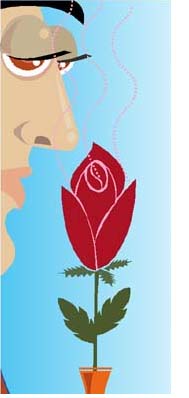

A forum for Hawaii's
business community to discuss
current events and issues

Employers who cut their staffs to the
bone risk creating workers too afraid
to look after their personal needs

EVERY organization claims, "Our people are our most important asset." Yet, the strategy of continued cost cutting to drive up short-term corporate profits may be having severe negative long-term consequences that we seem to be ignoring.
The scenario goes something like the following:
You feel really grateful and relieved to have survived the last few rounds of downsizing. Many of your work colleagues were not as fortunate. While they got pretty good severance packages, and most have found some kind of new jobs, many had to uproot their families and move to new locations. The whole process left emotional scars on them and their families.
So when your boss says, "I need those reports ASAP!" lunch goes by the wayside, or some less-than-healthful fast food is gulped down at desk-side.
If it's a really big job, and the "I need this ..." message comes late Friday afternoon, the family will likely hear, yet again, an explanation for your weekend absence. While you may resent these erosions into the quality of your life, you also know that "silence may be the better part of valor."
Indeed, I've heard many employees admit that there is an unspoken new rule these days: No complaining about being over-worked. There is a long line of people who would love to have your job.
The costs and consequences data are unequivocal. Since 1973, the average American is working 142 hours more a year. We are the only major industrialized country in the world "whose citizens are not entitled to a vacation by law." The average American takes 13 vacation days a year, half as many as the average South Korean or Japanese worker -- countries by no means noted for their lack of productivity!
And, here's what may be the real killer -- literally and figuratively. Of America's workers entitled to a vacation, 26 percent never take it. This, in spite of the fact that medical research clearly documents that the consequences of not "taking time to smell the roses" include heart attacks, strokes, high blood pressure and other stress-related illnesses.
The Japanese, who take twice as much vacation time as we do, call it "karoshi" -- literally, "death from overwork." Estimates put the karoshi figure in Japan at a conservative 10,000 people a year.
In other words, this pattern of self-sacrificial behavior comes at no small price. By allowing this pattern to continue, we are enduring steadily increasing health risks and a steadily eroding quality of life, for our families and ourselves.
And we cannot even, albeit foolishly, justify this pattern as resulting in increased workplace productivity. It is hard to imagine how people living poor-quality lives can actually contribute over the long-term to significant quality improvement at work.
Working harder does not equate with working smarter. Indeed, working smarter may actually require the physical, emotional, and spiritual re-energizing and rejuvenation a vacation is intended to provide.
But the real costs may be more subtle. When employees begin to feel imprisoned by their jobs, a pattern of resentment and denial begins to build up. Bodies continue to show up for work, but hearts, minds and souls are increasingly withheld. The result, as we have noted in other articles, is that 56 percent of a broad spectrum of America's middle management and general work force is just "hanging around and marking time" until they can retire.
This means that more pressure to produce will continue to fall on a shrinking minority workforce of committed loyal employees.
In the face of this mounting pressure, either the ranks of the "hangers around" will grow, or the medical consequences experienced by those who skip lunches and vacations will become exacerbated.
Ignoring quality of life while striving to enhance quality at work may prove to be lose-lose.
To participate in the Think Inc. discussion, e-mail your comments to business@starbulletin.com; fax them to 529-4750; or mail them to Think Inc., Honolulu Star-Bulletin, 7 Waterfront Plaza, Suite 210, 500 Ala Moana, Honolulu, Hawaii 96813. Anonymous submissions will be discarded.